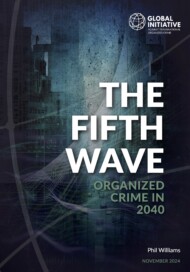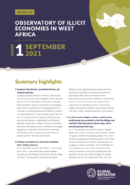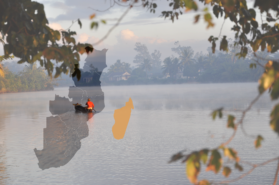Posted on 02 Dec 2024
The world is in flux. New governments, new technology and new challenges will define our lives in the coming year. We look through the telescopes of our Global Initiative observatories to see what could be on the horizon. Here are some of the things that we will be watching in 2025.
War and peace
A massive stash of trophy weapons has been piling up in Ukraine and Russia. De-escalation of the conflict in Ukraine in 2025 could trigger an outflow of weapons and an increase in violent crime on both sides of the border while a continuation of the conflict could see Russia step up its weaponization of criminals abroad to carry out its dirty work, such as sabotage and assassinations.
Criminal convergence in North Africa and the Sahel
Criminal ecosystems in North Africa and the Sahel are being shaped by conflicts in Mali, Burkina Faso, Niger and Sudan. Violence and instability are fuelling illicit markets in weapons, fuel, gold and mercenaries, and shaping the movement of people and goods in the Sahel. Criminal actors in the region have benefited from these markets and the demand by migrants and refugees to move northwards. These dynamics increase the likelihood of further democratic backsliding and instability in countries in the region in the coming year.
Test case Haiti
As criminal gangs expand their control in Haiti, the international community will be tested to take an operational response to reduce the violence, humanitarian crisis, and threats to governance in this battered country.
Palermo Convention turns green on its Silver Jubilee?
In 2025, UN member states will celebrate the 25th anniversary of the UN Convention Against Transnational Organized Crime ( the Palermo Convention). In 2024, the GI-TOC asked the question, is the UNTOC working? Will the anniversary be solely a nostalgic remembrance of a bygone international consensus to fight organized crime, or usher in a new era of cooperation to combat a common threat, which has evolved greatly since the Convention was adopted? In 2025, member states will also begin discussions, under the auspices of the UNTOC Conference of Parties, to consider whether an additional protocol on environmental crimes is needed, marking a key milestone in discussions on this topic.
Trouble along the cocaine supply chain
Cocaine could have an impact on elections in Ecuador in 2025, where political violence may occur, and anti-organized crime policies are a central theme in the campaigns. The opening of the Chancay Port in Peru is also something to watch. This massive infrastructure project, supported by China, could enable increased imports of precursors, counterfeit goods, and trade-based money laundering, as well as the potential establishment of direct cocaine routes to Asia. Unprecedented volumes of cocaine are transiting West Africa en route to Europe, underpinned by some of the most sophisticated organized crime groups in the world. Meanwhile, the demand for cocaine in Europe remains high. At the same time, the use of crack is spreading across Europe. In 2025, watch for growing violence in Europe as a result of competition over this lucrative market.
Wild West Africa
Armed non-state actors, including violent extremist groups, separatist groups and mercenaries, are drawing from criminal economies to expand their power and reach in West Africa. Their influence is spreading south across the region. Some of the illicit activities that finance these groups are cattle rustling, informal artisanal gold mining and trafficking of motorbikes. Criminal economies are also driving violence in Nigeria, perpetrated largely by armed bandit groups in the North West who have moved from cattle rustling, to kidnapping, to gold mining and forced labour. Watch this space in 2025.
Good morning, Vietnam?
States will gather in Hanoi in 2025 for the signing ceremony for the new UN cybercrime convention, with all eyes on the US, whose membership of the convention will be key to its impact. The current US administration, despite joining consensus on the treaty’s adoption, is lukewarm about prospects for signing and ratifying, following intense lobbying against the treaty from the private sector. The pieces are in place for the Trump administration to kick it into the long grass or flatly reject joining.
Tech for fraud
Scam compounds, for example in South East Asia, have defrauded thousands of victims globally, stealing billions of dollars. ‘Pig-butchering scams’ were just the start – what will the new scam in 2025 be? In the wrong hands, the rapid development of artificial intelligence and deepfake technology could exponentially increase the number of victims targeted by both humans and automated bots designed to extort, commit fraud and carry out other malicious activities such as identity theft.
No quick fix: opioid problem spreads
Incidents with deadly synthetic opioids have been on the rise across Europe. The main entry point is the flourishing illicit online market for prescription drugs – a problem thus far underestimated by authorities. Meanwhile, nitazenes – extremely potent synthetic opioids – have exploded across areas of West Africa in the form of ‘kush’, which has ravaged Sierra Leone, Guinea and Liberia. There is a serious risk that the opioid problem could spread further in 2025.
Sudan’s internal conflict drives displacement
Next year will mark the second year of the current civil war in Sudan. The chilling déjà vu unfolding in a country once described as a ‘petri dish for … every conceivable form of apocalyptic man-made misery’ has brought about the world’s largest displacement of people, which in turn has rapidly shaped regional human smuggling networks. A key question in 2025 will be whether the displaced will remain within Sudan’s neighbours, mainly Egypt, Chad and Libya, or whether worsening conditions facing them in the region will drive a growing number to embark for Europe.
More of the same on the road to Abu Dhabi?
Throughout 2025, states begin the preparatory process for the 15th UN Crime Congress, to be hosted in Abu Dhabi in April 2026. Through a set of regional meetings, and then the first negotiation sessions of an outcome document, states will have the chance to reflect on the growing seriousness and evolving nature of organized crime. Recent Crime Congresses have largely agreed on a business-as-usual collection of agreed language. In 2025, could states shift gears or will it be more of the same?
Will sanctions be a Trump card?
During his first term in office, President Trump used targeted economic sanctions to counter organized crime and corruption. His re-election could well portend an even more robust use of sanctions to counter a growing set of criminal challenges. A key question will be whether the incoming Trump administration can develop more nuanced strategic thinking on the aims of sanctions on crime, as distinct from those imposed on state-linked actors, which has tended to be lacking in the US and international community broadly.
Grey markets
If a trade war is ignited between the US and China, Mexico and Canada as well as Europe, watch for a boom in illicit trade in excisable goods, namely the illicit transport, distribution and sale of excise consumer goods to evade customs and taxes.
Back to the wall
Can Mexico’s new president, Claudia Sheinbaum, reduce homicides, disappearances, extortion, and other manifestations of organized crime-related violence? Ongoing judicial reforms, aimed at reducing corruption but criticized as a step backward for justice, add to the challenge, alongside potential U.S. border tightening and increased deportations.



